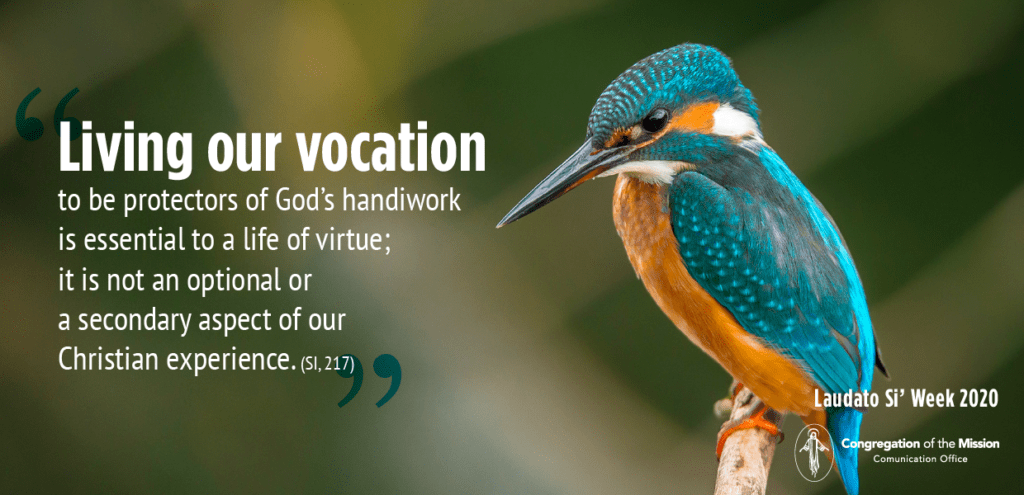
Pope Francis’s encyclical, Laudato si’, on care for our common home, bears the date of 24 May 2015. On the occasion of its fifth anniversary, the Pope himself announced a week, which begins today, 16 May, and will end precisely on 24 May. The intent of the Holy Father is to urge the whole world to respond concretely to the global ecological crisis, because the cry of the earth and the poor can no longer wait. The occasion is also a reason for us to ask ourselves some questions: what have we done in these five years? what has changed in our lifestyle? what can we or should we change more courageously and radically?
From its publication, the encyclical introduced into the common debate some expressions that dominate everyone’s attention today, such as that of an “integral ecology” (to which the entire chapter IV is dedicated), such as that “everything is connected” (see nos. 117 and 138), and such as “we are faced not with two separate crises, one environmental and the other social, but rather with one complex crisis which is both social and environmental” (no. 139). Of course, there is also the risk that these expressions become simple slogans, with a rapid trivialization of their content.
Yet, we must recognize that in these five years many things have changed or are changing: Laudato si’ has influenced profoundly our look at reality and also our lifestyle, urging us to take new paths and start new processes. The encyclical contains in itself a “generative charge,” which has not yet been exhausted; indeed, bringing with it an unsuspected vitality, which has not yet finished bearing fruit.
Look at creation through Laudato si’
Among the teachings of the encyclical, there is certainly that of having helped us to read reality by paying attention to the connections among our life’s multiple dimensions: ecological, economic, political, social, cultural, ethical, spiritual, etc.
This proved to be very topical as we confront the COVID-19 pandemic. This is evidently a “global phenomenon,” which involves the world population on a planetary level. It is also an “integral phenomenon,” in the sense that it crosses all our life’s dimensions: personal, family, and social. It concerns medicine and healthcare, but, at the same time, also the economy and work, our daily habits and our collective imagination. It impacts our relationship with social media and new technologies, as well as our spirituality, asking us questions of meaning that we cannot easily remove from our conscience.
Nevertheless, the pandemic is just one example, certainly the most topical one at the moment, of a “structural phenomenon” that has many facets: from climate change to migratory movements, from the drama of displaced persons and refugees fleeing hunger and wars to the crisis of democracy in the face of the threat of populist supremacy, from the urgency of a finance that respects sustainability to the new challenges of the dignity of work in the era of industry 4.0, and so forth.
In the face of all these phenomena, deeply diverse among themselves, but also with a single common denominator, the paradigm of integral ecology is particularly useful for accompanying and guiding the ongoing globalization processes, with all their interconnections and crossways.
Reread Laudato si’ from reality
A rereading of the encyclical in this “Laudato si’ Week” allows us to reflect on some necessary steps, particularly in this time of pandemic. For example, we can better understand Pope Francis’s invitation to “globalize solidarity.”
We are becoming increasingly aware that we can no longer understand solidarity with a geographical accent: in fact, we experience, as acts of solidarity, being at home, respect for security spacing measures (I do not like to talk about “social distancing” that induces the per se negative idea of “social isolation”), and the use of protective devices.
Solidarity today takes on new faces, new facets. Globalizing solidarity means living it in private and daily spaces, freeing it from the welfare view that has characterized it for centuries, especially in the ecclesial sphere.
In the current situation, the individualistic mentality that fails to perceive a sacrifice in favor of the community and that exposes oneself and others to serious health risks by paying no attention to contagion containment measures is not acceptable.
A careful rereading of Laudato si’ in this “Laudato si’ Week” helps us to question the selfish closures of individual European countries for their national interests, which prevent the European Union from reaching shared solutions, “a healthy politics … sorely needed, capable of reforming and coordinating institutions, promoting best practices and overcoming undue pressure and bureaucratic inertia” (LS, no. 181) or which support the short or very short-term craving for profit regardless of considerations on the social and environmental effects of their actions (see LS, no. 195), perhaps combined with the technocratic illusion that it is possible to find a technical solution to any problem (including coronavirus), without questioning our choices.
The coronavirus is a drama for all humanity. But, at the same time, it is a great occasion: it is helping us to become aware of the limits of our lifestyle and to recognize the opportunity to reconsider our development model in the direction of greater justice and sustainability.
We hope that this pandemic will soon pass, but not in order to return to “normality,” but rather to reach a new and urgent goal: what Laudato si’ calls an “integral ecology.”
Giuseppe Turati, CM
Rome, 16 May 2020

